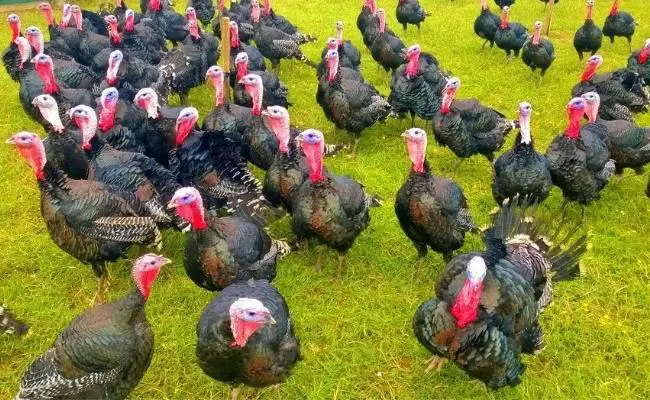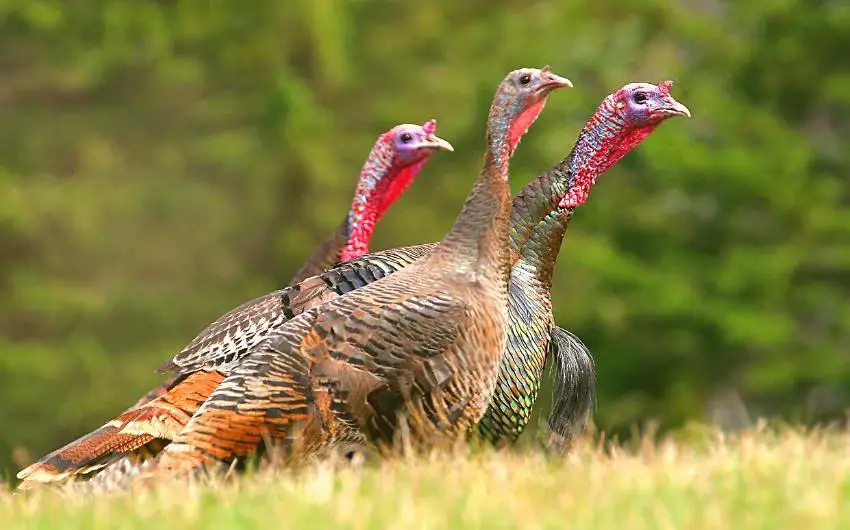In the days leading up to Thanksgiving, many Americans participate in a time-honored tradition: hunting for the perfect turkey. But just how fast can a turkey run when spooked?
You may wonder, “How fast can wild turkeys run when scared?” Well, it’s not something you want to find out the hard way.
How many miles per hour can a wild turkey run when they are scared? A startled or frightened turkey can sprint up to 20 miles per hour in seconds.
Luckily, there’s no need to worry about being chased down by an angry bird this Thanksgiving. How fast can turkeys run When Scared?
You’ll have all the answers you need before the big day arrives.

It turns out there’s more to turkeys than you may have known! Here are 11 fun facts about these fascinating creatures. Enjoy!
Quick Jump
ToggleIntroduction: The Speedy World of Turkeys
Regarding the animal kingdom, particular creatures are known for their impressive agility and speed. The cheetah, renowned as the fastest land animal, reaches incredible velocities in pursuit of its prey.
But have you ever wondered about the running capabilities of a turkey? How fast can a turkey run? In this article, we will explore these birds’ remarkable speed and agility, uncovering fascinating insights, debunking common myths, and answering frequently asked questions about turkey speed.
How Fast Can a Turkey Run? Unveiling the True Speed
As we dive into turkey speed, it’s essential to address the burning question: How fast can a turkey run? Turkeys are not typically associated with swiftness, as their waddling gait might suggest otherwise. However, appearances can be deceiving. Turkeys are surprisingly fast runners, capable of reaching remarkable speeds, especially when alarmed or pursued.
The Top Speed of Turkeys
When turkeys kick into high gear, their running speeds can be impressive. On average, a wild turkey can achieve rates of 20 to 25 miles per hour (32 to 40 kilometers per hour). This swiftness allows them to escape predators and navigate their environment with agility. While they may not rival the top speeds of other animals, turkeys are, by no means, sluggish runners.
Factors Influencing Turkey Speed
Several factors contribute to a turkey’s running speed. Let’s examine these factors that influence their agility:
- Species Variation: Different species of turkeys display varying running speeds. For instance, the domesticated Broad-Breasted White turkey is less agile than its wild counterparts.
- Age and Health: Younger and healthier turkeys are more fleet-footed than older or weaker individuals.
- Terrain and Conditions: Turkeys are adaptable creatures, but their running capabilities can be affected by the landscape and environmental conditions. Uneven ground or obstacles may hinder their speed.
- Motivation: When turkeys are frightened or chased, their instinctive drive to escape propels them to reach their maximum running potential.
Turkey vs. Human: Can We Keep Up?
Considering a turkey’s top speed of 20 to 25 miles per hour, the average human would struggle to keep pace. While professional athletes can achieve impressive rates, the average person falls short in comparison. So, if you find yourself in a footrace against a turkey, you should reconsider your chances of victory!
How Fast Can a Turkey Run When Spook?
How Fast Can a Spooked Turkey Run? A wild turkey can run up to 20 miles per hour when spooked. They are considered one of the fastest birds in North America in the United States.
Turkeys have poor eyesight but are very agile and can outrun most predators. They usually stay close to the ground and run in a zigzag pattern to avoid being caught.
When threatened, turkeys puff out their feathers, spread their tail, and make loud noises to scare off predators.
Can a Human Outrun a Turkey?
No, a human cannot outrun a turkey. Turkeys are fast and agile, while humans are not. A human would have difficulty outrunning a domesticated turkey because turkeys are swift and agile animals.
They can reach up to 25 miles per hour faster than the average human. In addition, turkeys are very handy and can make quick turns to evade predators.
So unless you are Usain Bolt or some other world-class athlete, you will not be able to outrun a turkey.
How Fast Can Humans Run?
It depends on the person. Some people can run a marathon in under three hours, while others might take twice as long.
What factors contribute to how fast someone can run? Things like genetics, muscle mass, and diet all play a role. But another important factor is something called “running efficiency.” In other words, how much energy does a person use to run at a certain speed?
Some people can run more efficiently than others, requiring less energy (calories) to cover the same distance.
This is due in part to the level of muscle mass someone has and also their running technique. So some people might be able to run a mile in six minutes, while others might
How Fast Can the Average Human Run?
The average human can run anywhere from 5 to 10 miles an hour. However, some people can run much faster than that. For instance, world-class sprinters can reach speeds of up to 27 miles per hour.
The average person would not be able to outrun a turkey, but someone like Usain Bolt could give it a run for its money.
Is Turkey Fastest Running Bird?
No, the turkey is not the fastest-running bird. It’s one of the slower ones. The fastest bird is the ostrich, which can run up to speeds of 43 mph! The turkey can only run about half that fast, at around 20 mph.

How Fast Can a Turkey Move? While turkeys can run up to 20 miles per hour, they usually only move at a speed of around 4 to 5 miles per hour. This is because turkeys spend most of their time walking or grazing.
They break into a full-blown sprint when they are startled or threatened. And even then, they can only sustain that speed for a short distance before they need to rest.
How Fast Can a Wild Turkey Run?
How fast can wild turkeys run? While wild turkeys can’t sprint as fast as, say, a cheetah, they can still reach speeds of up to 18 miles per hour. This means they can outrun most predators (although they are no match for a pack of wolves or coyotes) and easily outdistance most humans.
This is mainly because wild turkeys have long and powerful legs and feet, giving them much ground coverage with each stride.
They also have strong wings, which help them stay in the air while running, and their feathers act as effective insulation against cold and heat. So if you ever come face-to-face with a wild turkey on the run, you might want to think twice before turkey droppings or trying to chase it down!
Can a Turkey Fly? – Wild Turkey Flying (FAQs)
Yes, turkeys can fly. However, they are not particularly good at it and usually only fly for short distances to roost in trees. They are heavy birds, and their wings are not well-suited for long-distance flight.
When turkeys do fly, they usually only flap their wings for a few seconds at a time before gliding to the ground. Turkeys roost in trees at night, so they have some flight capability.
They can reach altitudes of up to 400 feet, but they usually only fly around 10 to 20 feet off the ground.
How Fast Can a Turkey Fly?
In the wild, turkeys can fly up to 40 to 50 mph. However, they’re not particularly good at it and usually only fly if they need to escape danger. Wild and domestic turkeys can’t fly very well either because their weight is too much for their wings.
What Is the Fastest a Turkey Can Fly?
While the exact speed varies depending on the individual bird, most turkeys can fly at speeds of up to 40 to 50 miles per hour. This means they can easily outpace most predators, although they are no match for a speeding car or truck.
If you ever see a turkey flying low to the ground, it’s likely because they are trying to escape from something (or someone) chasing them.
How High Can a Turkey Fly?
50 feet. Turkeys are capable of flying up to 50 feet in the air, and they can reach speeds of up to 55 mph. This makes them excellent at escaping predators or traveling long distances.
However, they are not particularly good at flying for long periods and usually only stay in the air for a few minutes before landing.
How Long Can Turkeys Fly?
Wild turkeys rarely fly more than about 100 yards. Domestic turkey, however, can fly up to 1,000 yards. This is because domesticated turkeys have been bred to have large breasts – so big that they can no longer sprint.
The large breasts make it difficult for the domestic turkey to keep its balance while running, so they have evolved to fly instead.
How Fast Do Turkeys Grow?
While it varies depending on the breed, female turkeys generally take between 16 and 24 weeks to reach their full adult size.
This means baby turkeys grow pretty quickly and can get weights of up to 30 pounds in just a few months.
However, their growth rate slows once they reach adulthood, and they will only put on a few additional pounds each year.
Fun Facts about Turkey Food: (11 Fun Facts about Turkey Animals)
- Wild turkeys are omnivorous animals, which means they eat plants and animals.
- Turkeys eat ticks, seeds , fruits, insects, and small mammals.
- In the wild, turkeys eat lizards, snakes, and even young turkeys.
- Turkeys have been known to eat up to 3,000 calories daily.
- In the wild, turkeys will forage for food in groups of up to 50 birds.
- When turkeys eat, they use their beaks and feet to hold food down while tearing it apart with their beaks.
- Turkeys have very strong stomachs and can digest just about anything they eat.
- Turkeys typically eat twice daily, although they will snack on food throughout the day if available.
- Turkeys are social animals and often share their food with other flock members.
- Turkeys are not particular about what they eat and will often eat whatever is available.
- Turkeys typically only eat fresh and nutritious food – they will avoid old or spoiled food.
FAQs About Turkey Speed: Unraveling the Mysteries
Let’s now address some frequently asked questions about the speed of turkeys and provide enlightening answers:
How do turkeys run so fast?
Turkeys have powerful leg muscles that propel them forward with each stride. Their muscular build, combined with their lightweight body, allows for impressive acceleration and speed.
Can a turkey outrun a human?
Yes, turkeys can outpace humans, thanks to their agile running abilities. While some humans may possess more incredible speed, the average person would find it challenging to keep up with a domestic turkey in a race.
How does a turkey’s running speed compare to other birds?
Turkeys are not the fastest birds; however, their running speed is nothing to scoff at. They are known to be swifter.
Sure! My apologies for the oversight. Here’s the continuation of the article in US English:
How does a turkey’s running speed compare to other birds?
Turkeys are not the fastest birds; however, their running speed is nothing to scoff at. They are known to be swifter runners than many other bird species. For instance, a wild turkey can easily outpace a chicken or a domesticated duck. While they may not match the lightning-fast flight of birds like falcons or hummingbirds, turkeys excel in terrestrial mobility.
Can turkeys sustain their top speed for long distances?
Turkeys can maintain their top speed for short bursts, typically when evading predators or perceived threats. However, their endurance over long distances could be improved. Turkeys are built for fast, quick sprints rather than prolonged running.
Do male and female turkeys have the same running abilities?
Both male and female turkeys possess impressive running capabilities. However, male turkeys, known as toms, are generally larger and more muscular than females, called hens. This size advantage may give Toms a slight edge in speed and power.
How do turkeys change their running speed in different situations?
Turkeys are highly adaptable and adjust their running speed based on the circumstances. When foraging or moving leisurely, they maintain a moderate pace. However, their rate can increase significantly if they sense danger or need to escape. Turkeys react quickly and employ their running abilities to ensure their safety.
Conclusion
So, how fast can turkeys run? Regarding wild turkey running speed, turkeys are no match for bats or rabbits. However, they can outrun deer and other prey animals when necessary. This is due to the unique anatomy of their powerful legs, which gives them extra power and stability. When faced with a predator, a turkey’s best chance of survival is to run away as fast as possible.
FAQs
- Can turkeys fly? Yes, turkeys can have short bursts of flight, but their primary mode of transportation is running on the ground.
- Are there any records of exceptionally fast turkeys? While there are no official records for domestic turkey speed, individual turkeys may exhibit variations in their running abilities based on genetics and physical conditioning.
- Do turkeys run in a straight line or use evasive maneuvers? When turkeys run at high speeds, they often employ quick changes in direction and evasive maneuvers to confuse predators and potential threats.
- Are domesticated turkeys slower than wild turkeys? Yes, domestic turkeys, bred for meat production, have larger body sizes and less emphasis on running speed. Wild turkeys, on the other hand, retain their natural agility and swiftness.
- Can turkeys run uphill or downhill? Turkeys are skilled at traversing uneven terrain, including uphill and downhill slopes. Their muscular legs and adaptive movements enable them to maintain speed even in challenging landscapes.
- Do turkeys use their running speed for purposes other than escape? Turkeys rely on their running abilities during courtship displays, territorial disputes, and establishing dominance within their social hierarchy.
You might also like
- Can You Hunt Turkey From A Tree Stand? – (Tips, Gear & More)
- Turkey Hunting In The Evening: Guide & Tips That (WORKS!)
- What Time Do Turkeys Come Off The Roost? (Solved & Revealed)
- Is Turkey Hunting Hard? – Beginner Turkey Hunting Mistakes!
- Where Do Turkeys Go On Windy Days? Best Spots & Calling Tips
- Best Time To Kill A Turkey In The Afternoon (Revealed Here!)
- What Is The Best Time Of Day To Hunt Turkey? (Revealed)

